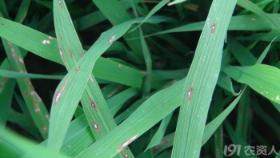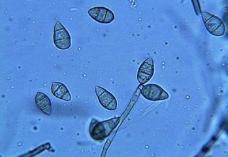
Research project to improve food security in China
Researchers have made a breakthrough in their bid to tackle rice blast fungus – the disease which has the largest affect on global rice yields.
Each year, up to 30 per cent of global losses of rice, enough to feed millions of people, are caused by blast fungus, which is therefore regarded as a major threat to global food security.
The University of Wolverhampton is collaborating with academic staff based at Yunnan Agricultural University, P.R. China (YAU), to study the disease and scientists have discovered a protein which boosts the crop’s defences against blast fungus and other plant pathogens.

Dr Timothy Baldwin, Reader in Plant Cell Biology at the University of Wolverhampton, in collaboration with Professor Li Chengyun (YAU) have identified a membrane - associated glycoprotein - that appears to play an important role in the innate immune response of rice to infection with blast fungus.
They are conducting an in-depth investigation of the molecular mechanism by which blast fungus infects rice in a number of cultivars (cultivated varities) that are eiter susceptible or resistant to infection.
Dr Baldwin said: "These findings are very exciting; anything which could potentially reduce the effects of this fungus on rice yields, could have a major impact on food security in China and elsewhere where rice is grown."
Dr Baldwin has recently completed the co-supervision of a PhD student (Yanli Liang) working on this project and is currently co-supervising a second research student who is continuing this work, based upon the results obtained in the initial study.
The eventual aim of this project is to develop methods to prevent/reduce infection of rice by this pathogen, and thereby increase the yield of this important crop. This is a long-term, ongoing project the results of which could be of major significance to Chinese/Asian agriculture and to Chinese food security.
In 2011 Tim was awarded a visiting Professorship at YAU. As a result of which, the authorities at YAU fund an annual research visit to Professor Li’s lab, where Tim’s work includes teaching experimental techniques that are under-utilised at YAU, presenting research seminars and discussing current and future research projects.
Reference:
Yanli L, Zhao J, Decondge W, Jing Y, Li C. and Baldwin T.C. (2018). Infection with blast fungus (Magnaporthe orzyae) leads to increased expression of an arabinogalactan-protein epitope in both susceptible and resistant rice cultivars. Physiological and Molecular Plant Pathology, 102, p. 136 – 143.


Figure 1: Tim being awarded his Visiting Professorship at YAU in 2011.
Figure 2 : Rice, rice blast fungus and rice infected with rice blast fungus.
For more information please contact the Corporate Communications Team.


/prod01/wlvacuk/media/departments/digital-content-and-communications/images-2024/240328-Varsity-Line-Up-Resized.jpg)
/prod01/wlvacuk/media/departments/digital-content-and-communications/images-18-19/220325-Engineers_teach_thumbail.jpg)
/prod01/wlvacuk/media/departments/digital-content-and-communications/images-2024/240404-Digital-Humanities-Training-Resized.jpg)
/prod01/wlvacuk/media/departments/digital-content-and-communications/images-2024/240320-Uzbekistan-Resized.jpg)
/prod01/wlvacuk/media/departments/digital-content-and-communications/images-2024/240229-The-Link-Resized.jpg)
/prod01/wlvacuk/media/departments/digital-content-and-communications/images-2024/240404-Pharmacy-Students-Resized.jpg)

